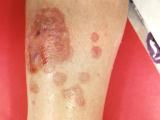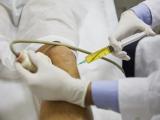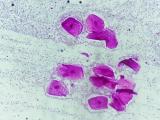Mar 20, 2012 (CIDRAP News) – The tuberculosis toll in Europe continued a slow overall decline in 2010, but the treatment success rate for the disease is slipping as drug-resistant strains of TB grow more common, according to a report released today by the European Union (EU) and the World Health Organization (WHO).
Also today, a coalition of TB organizations released a 10-year strategic plan for developing better TB vaccines, and the medical aid group Medecins Sans Frontieres (MSF), or Doctors Without Borders, said new data suggest that multidrug-resistant TB (MDR TB) is more widespread globally than previously thought.
The reports and statements were issued in connection with World TB Day, Mar 24, which marks the date in 1882 when Robert Koch discovered the TB bacillus.
Fewer cases in Europe
The European report provides sets of data for (1) the 53 countries of the WHO's European Region, with a population of 894.5 million, and (2) the EU and European Economic Area (EEA), comprising the 27 EU members plus Iceland, Liechtenstein, and Norway, with a population of 504 million.
The WHO European Region had 309,648 new TB cases in 2010, 2.6% fewer than in 2009, according to the report and an accompanying press release from the European Centre for Disease Prevention and Control (ECDC). The overall TB case total for the region was estimated at 418,000.
"This confirms the general decrease in reported TB cases over the last five years across Europe," the ECDC release says. "However, rising numbers of multidrug- and extensively drug-resistant tuberculosis (M/XDR TB) pose a serious threat in the attempt to eliminate TB, highlighting the importance of early detection and adequate treatment of tuberculosis in the region."
For the EU and EEA, TB cases reported in 2010 totaled 73,996, of which 79% were new, the report says. The case total was 7% (5,685) lower than the previous year.
Among new cases in the European Region, 13.7% were MDR TB, compared with 12% in 2009, according to the report. The share of MDR TB among previously treated cases was much higher, at 48.7%, up from 47% in 2008. The region had more than 29,000 patients with MDR cases.
Even as reported TB cases in Europe declined slowly from 2005 to 2010, treatment success rates edged downward. The rates "are dramatically low now at 68.7% and 47.6% among new and previously treated TB patients, mainly due to presence of MDR TB," the release states. The success rate among MDR TB patients was 56.3%.
"Our region has the lowest TB treatment success rate and the highest M/XDR TB rate in the world," said Zsuzanna Jakab, WHO regional director for Europe, in the release. "TB has not spared any country in our region, but has hit hardest in the 18 high priority TB countries mainly in the eastern part of the region."
In those 18 countries, the report says, the rate of newly detected and relapsed TB cases is about eight times as high as in the rest of the region: 68.5 versus 8.4 per 100,000 population.
Officials estimate that TB caused 60,000 deaths in the region in 2010, or 6.7 per 100,000 people. It also says the region had a case-detection rate of 74%, showing that its surveillance system is highly sensitive.
The report also says that TB in children is still a major concern in the region, with about 10,000 TB cases reported in children younger than 15.
Vaccine plan announced
Meanwhile, the coalition known as the Stop TB Partnership announced today the release of a plan for developing TB vaccines called "Tuberculosis Vaccines: A Strategic Blueprint for the Next Decade." The plan is to be published in Tuberculosis.
The experts who wrote the plan concluded that "effective solutions will remain out of reach unless the world scales up efforts to solve the scientific puzzles now hindering development of vaccines against the airborne pathogen," the coalition said in a press release.
Between 2000 and 2010, vaccine researchers moved an unprecedented 15 candidate vaccines into clinical trials, but much more work is needed, the coalition said. It called for increased global collaboration, leadership, and commitment.
"To address the many challenges posed by TB, ideal vaccine regimens must protect babies at birth from childhood TB, and prevent infection with the organism in older children and adults," the group said. It said the only existing vaccine—Bacille Calmette-Guérin (BCG)—protects children from severe forms of TB in the first years of life, but it doesn't prevent pulmonary TB, which affects adolescents and adults. A vaccine also is needed to protect people with latent TB from actually getting sick.
The vaccine plan was developed with support from the WHO, the Bill & Melinda Gates Foundation, the US National Institute of Allergy and Infectious Diseases, and other groups.
MDR TB data called alarming
Also today, MSF warned in a press release, "Alarming new data suggest that the global scope of [MDR TB] is much more vast than previously estimated, requiring a concerted international effort to combat this deadlier form of the disease."
"Wherever we look for drug-resistant TB we are finding it in alarming numbers, suggesting current statistics may only be scratching the surface of the problem," said MSF President Dr. Unni Karunakara. "With 95 percent of TB patients worldwide lacking access to proper diagnosis, efforts to scale-up detection of MDR TB are being severely undermined by a retreat in donor funding—precisely when increased funding is needed most."
For example, in northern Uzbekistan, 65% of the patients treated by MSF in 2011 had MDR TB, the organization said. Of those patients, 30% to 40% came to the clinic for the first time, an "unprecedented number," suggesting that drug resistance was not only spurred by incorrect treatment but was also spreading on its own.
In India, over-the-counter drug sales and an unregulated private health sector continue to fuel the development of drug resistance, MSF said. An estimated 99,000 people are infected with MDR TB each year, of whom only 1 % receive adequate treatment.
MSF said it wants governments, international donors, and drug companies to fight the spread of drug-resistant TB with new financing and new efforts to develop affordable diagnostic tools and drugs. "Far shorter and less toxic drug regimens are needed, along with currently non-existent formulations for children, and a point-of-care diagnostics test," the group said. "Regulatory measures need to be enforced to prevent further spread of the disease due to mismanagement by practitioners."
See also:
Mar 19 ECDC press release
http://ecdc.europa.eu/en/press/Press%20Releases/Joint_PR_WTBD_final.pdf
Full ECDC report (172 pages)
http://ecdc.europa.eu/en/publications/Publications/1203-Annual-TB-Report.pdf
Mar 20 press release about the TB vaccine blueprint
http://www.eurekalert.org/pub_releases/2012-03/bc-nvs031412.php
Mar 20 MSF press release
http://www.msfaccess.org/our-work/tuberculosis/article/1787






















